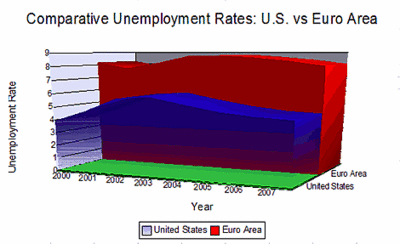Euro Area Woes Sustain U.S. Bond Prices
by John Schroy filed under Agencies, Mortgages, Corporate Bonds, Foreign Investors
Recent statistics released by the OECD confirm what we have long known: Euro Area unemployment runs about twice that of the United States. Projections released by the OECD on 07-Feb-2006 show that this trend is expected to continue through 2007:
 US Unemployment Compared to Europe
|
||
The Wall Street Journal, in an editorial on 08-Feb-2006 (”The European Disease”), citing the same OECD report, said that the rate of GDP growth per capita for Germany, France, and Italy is falling, relative to the U.S., and that Jean-Phillippe Cotis, chief economist at the OECD said that at this rate, in twenty years, the average U.S. citizen would be twice as rich as a Frenchman or German.
So, what does this have to do with the price of U.S. bonds?


